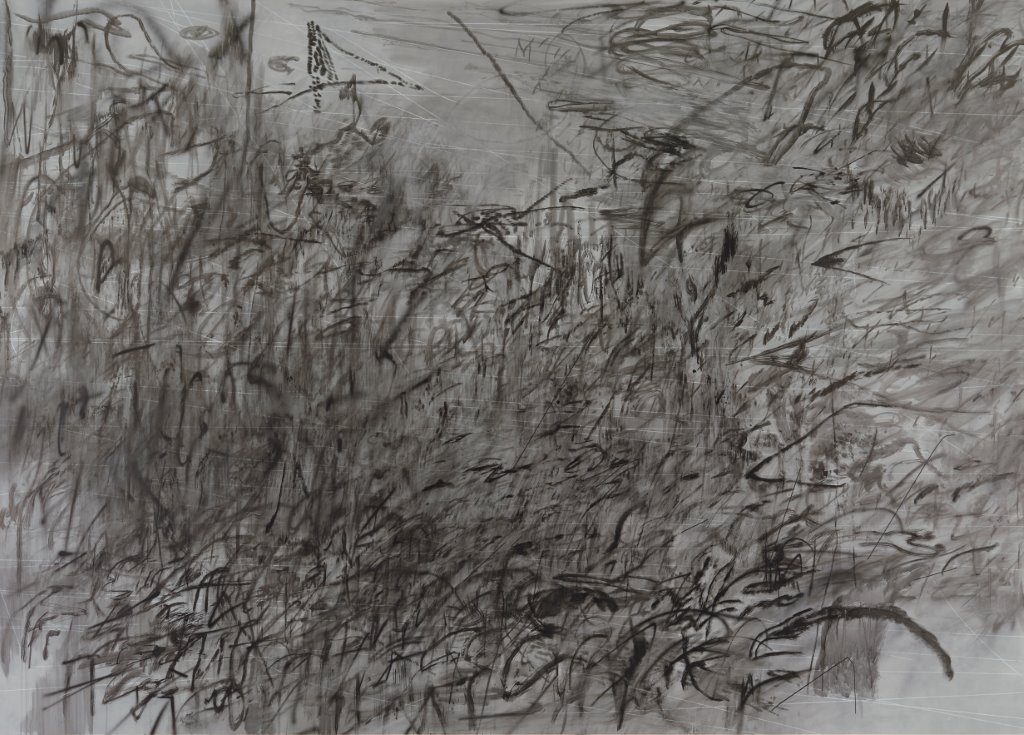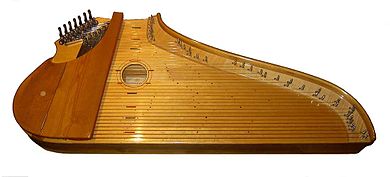Op een achterdoek met kalligrafisch gebladerte in alle denkbare tinten grijs vallen reusachtige, diepzwarte schaduwen. Regisseur Peter Sellars volgt tijdens een doorloop van ‘Feather Mantle’ bij De Nationale Opera aandachtig de bewegingen van de drie hoofdpersonen. Samen met ‘Always Strong’ vormt deze korte opera de double-bill Only the Sound Remains van Kaija Saariaho waarmee 15 maart het Opera Forward Festival geopend wordt.

Only the Sound Remains is gebaseerd op twee traditionele stukken uit het Japanse Nôh Theater. Dit wordt weerspiegeld in de uitvergrote, trage bewegingen van countertenor Philippe Jaroussky, bariton Davone Tines en danseres Nora Kimball-Mentzos. De diffuse, etherische muziek van Saariaho wordt uitgevoerd door een zevenkoppig instrumentaal ensemble en een vierstemmig koor. Tijdens de repetitie ruim twee weken voor de première zingen de twee solisten alles al uit hun hoofd, de koorzangers lezen van blad.
De tenor Albert van Ommen vertelt hoe moeilijk de koorpartijen zijn: ‘We zijn onderling heel dissonant, hebben geen enkel houvast aan elkaar. We leren nu van welk instrument we onze cue kunnen pakken en daardoor ga ik de muziek eindelijk begrijpen en waarderen.’ Ook Jaroussky erkent dat Saariaho’s taal lastig is. Hij heeft grote moeite gehad zijn rol uit het hoofd te leren, maar is opgetogen over haar werkwijze: ‘Doordat mijn stem elektronisch wordt gemanipuleerd, kan ik me helemaal concentreren en de kleinste inflecties aanbrengen. Zo zal de opera bij elke uitvoering anders klinken.’
Na afloop van de repetitie spreek ik met Kaija Saariaho, van wie DNO ook de opera’s Emilie en L’amour de loin produceerde. Zoals ook tijdens eerdere interviews, onder andere over Circle Map dat zij in 2012 componeerde voor het Koninklijk Concertgebouworkest, formuleert de Fins-Franse componist bedachtzaam. Een uitbundig prater is ze nooit geweest.
Only the Sound Remains is de opening van het Opera Forward Festival. Is het nodig de toekomst van opera veilig te stellen?
‘Het instituut opera is van nature oud en zwaar, omdat er zoveel kunstvormen in zulke grote formaties bijeenkomen: grote koren, groot orkest, talloze solisten, decors, kostuums et cetera. Maar zelfs met die traditionele elementen kun je dingen doen die ons tegenwoordig anders aanspreken. Alleen al omdat ze gemaakt worden door componisten van nu. Specifiek in deze double-bill doe ik iets heel anders: ik heb maar zeven musici. Daar staat een enorme batterij live elektronica tegenover en hoewel het toneelmatig veeleisend is, kan Only the Sound Remains ook op andere plaatsen dan in een operahuis worden opgevoerd.’
Nieuwe opera’s trekken minder publiek dan het gangbare repertoire. Hoe gaat u daar als componist mee om?
‘Wel… (Ze lacht verontschuldigend) Ik vind het eerlijk gezegd de taak van de organisator aan het publiek uit te leggen dat dit interessante kunst kan zijn, al is het geen Puccini. In dit geval hebben we fantastische zangers, onder wie Philippe Jaroussky, die exceptioneel is. Ik kan me voorstellen dat veel mensen die van zingen houden naar de opera komen, ook al hebben ze a priori geen positieve gevoelens over mijn muziek. Misschien komen ze om Philippe te zien en horen. ‘
Peter Sellars stelde voor Jaroussky te vragen, hoe reageerde u hierop?
‘Ik had van meet af aan een countertenor in gedachten voor de geest in ‘Always Strong’ en ken Jaroussky al lang. In Parijs heb ik veel van zijn concerten bezocht, ik hou erg van zijn stem en manier van zingen. Op de een of andere manier leek hij buiten mijn bereik, want ik had hem nooit gehoord in hedendaagse muziek. Dus toen Peter met het idee kwam hem te vragen was ik aangenaam verrast. We zeiden tegen elkaar: we kunnen het altijd proberen!
Philippe Jaroussky ging akkoord en toen zijn we samen aan de slag gegaan. We bestudeerden zijn stem en hij zong me verschillende dingen voor. Aanvankelijk was ik wat voorzichtig, want ik kende niet al zijn mogelijkheden, bovendien is elke countertenor anders. Toen ik ‘Always Strong’ af had, zijn we weer bij elkaar gekomen om de partituur door te nemen. Hij heeft wat voorstellen gedaan, waarop we sommige passages hebben aangepast. Toen opperde hij dat hij ook graag de engel wilde zingen in ‘Feather Mantle’ en nu kan ik me niet meer voorstellen hoe het anders had gekund. ‘
Jaroussky zei verrukt te zijn over de elektronische manipulaties van zijn stem. Wat moeten we ons daarbij voorstellen?
‘Alle elektronica wordt real time ingezet, dus zijn stem wordt live bewerkt met verschillende vormen van echo en vertraging. Speciaal voor deze opera heb ik nieuwe software ontwikkeld, samen met Christophe Lebreton, met wie ik al jaren samenwerk. De elektronica in de twee opera’s is heel verschillend. In ‘Always Strong’ vermenigvuldigen we Philippe’s stem door zijn zanglijnen als het ware op elkaar te stapelen, zodat donkere boventoonweefsels ontstaan; in ‘Feather Mantle’ passen we een effect toe waardoor zijn stem een klokachtige textuur krijgt.’
De twee opera’s heten samen ‘Only the Sound Remains’, vanwaar deze titel?
‘Die is ontleend aan een regel uit Tsunemasa (‘Always Strong’). De teksten zijn erg diepzinnig en toen Peter en ik nadachten over een overkoepelende titel realiseerden we ons dat alle materie verdwijnt uit ons leven. Dat idee wordt raak getroffen in deze frase, die komt uit een poëtische zin over de natuur. Sowieso zitten in beide stukken prachtige beschrijvingen van de natuur. Het klinkt ook een beetje mysteries, wat goed past bij dit werk.’
Wat trekt u aan in de twee Nôh stukken?
‘Beide zijn symbolisch en metaforisch, zodat iedereen er zijn of haar eigen interpretatie van kan maken, dat trok me erin aan. ‘Always Strong’ gaat over de geest van een strijder die terugkeert omdat er een herdenkingsdienst voor hem wordt gehouden. Hij is gesneuveld op het slagveld en het libretto beschrijft zijn relatie met de wereld, hij beweegt voortdurend op de grens van (on)zichtbaarheid.
Het tweede stuk Hagorono (‘Feather Mantle’) verhaalt van een engel die haar verenmantel heeft laten vallen en niet terug kan vliegen naar de hemel. Haar verenkleed wordt gevonden door een visser, die het niet terug wil geven. Pas als de engel belooft voor hem te dansen, krijgt ze de mantel terug, waarna ze al dansend boven de berg Fuji verdwijnt. Ook dit is een simpel verhaal, dat je naar je eigen gevoel kunt interpreteren.‘Wat is uw eigen interpretatie?
‘Ik kwam door de vertalingen van Ezra Pound op deze toneelstukken. Al eerder, in Sombre voor bariton en zes musici had ik een tekst van hem gebruikt. Zijn taal is zó inspirerend, hij zegt veel met weinig woorden, ook in deze sprookjesachtige verhalen. Dat paste perfect, want het was mijn bedoeling de muziek veel ruimte te geven in dit project. Bovendien wilde ik werken met een countertenor, personages vinden die bovennatuurlijk zijn én elektronica inzetten. Er kwamen in mijn keuze voor deze twee stukken dus veel dingen samen. De geest en de engel zijn een beetje geheimzinnig, maar ik ga niet uitweiden over mijn eigen interpretatie. Mijn muziek is mijn interpretatie!’
Hoe heeft u de bezetting gekozen?
‘Ik heb nooit eerder met een countertenor gewerkt en wil in elk nieuw stuk een andere uitdaging aangaan. Bovendien past dit ambigue stemtype – noch mannelijk noch vrouwelijk – goed bij de thematiek. Als tegenwicht koos ik voor een meer aardse bariton. Ik wilde absoluut een fluit, niet alleen omdat die in beide teksten genoemd wordt, maar ook omdat ik graag wilde werken met Camilla Hoitenga, die mijn taal door en door kent. Gezond verstand dicteert dan dat je ook een strijkkwartet inzet en uiteraard percussie.

Een bijzonder slagwerkinstrument is de kantele. Dit Finse hakkebord is verwant aan de Japanse koto, maar heeft een heel andere klank omdat het stalen in plaats van zijden snaren heeft. De kantele is in Finland populair, maar ik had er nog nooit voor geschreven en werd aangetrokken door zijn tinkelende klank. In Emilie had ik ervaren hoe ik de muziek kon kleuren met een klavecimbel. Zo kon ik haar een eigen identiteit geven, nu wordt de algehele klankkleur mede bepaald door de kantele. Het vierstemmige koor becommentarieert en beschrijft de handelingen van de karakters, vergelijkbaar met het koor in Griekse tragedies.’
U werkt samen met Peter Sellars, met wie u eerder L’amour de loin, Adriana Mater, en La Passion de Simone realiseerde. Wat trekt u in zijn aanpak?
‘Hij besteedt ontzettend veel aandacht aan het project als geheel en aan de muziek. Hij weet op een heel eigen manier zangers te motiveren werkelijk expressief te zingen en kan altijd precies uitleggen waarom hij doet wat hij doet. Mensen noemen zijn ensceneringen vaak provocatief, maar zien niet hoeveel effect hij op de zangers heeft. Dat geeft een enorme diepte aan hun interpretatie, een aspect van zijn werk dat vaak over het hoofd wordt gezien. Ik vind het een privilege met hem te mogen werken.’
Ik maakte voor SWR2 Cluster een reportage, die werd uitgezonden op 18 maart 2016. Hij is te beluisteren op YouTube:
